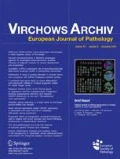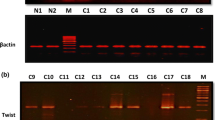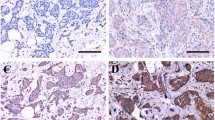Abstract
The role of calcium independent inducible nitric oxide synthase (iNOS) in breast carcinoma is controversial, and the implications of iNOS expression on prognosis are not known. In this study, we aimed to investigate the significance of immunohistochemical iNOS expression in 100 invasive ductal carcinomas. In addition, 11 normal breast tissues, 20 cases of usual ductal hyperplasias (UDHs) and 20 fibroadenomas were included. We found that 78% of malignant and 75% of benign cases showed iNOS immunoreactivity. However, the intensity and the quantity of iNOS expression were significantly higher in the cancer group when compared with benign breasts (P<0.001), suggesting a role of iNOS in breast carcinogenesis. We were unable to show a correlation between iNOS expression and tumor grade, axillary lymph node status, and estrogen receptor expression. In 50 axilla negative cases having 5–12 years follow-up, disease free survival (DFS) rate was significantly lower in cases showing strong iNOS expression (P=0.05). As strong iNOS expression was correlated with short DFS, we concluded that further studies would be necessary to elucidate if iNOS expression might be a useful prognostic marker in breast carcinoma, especially in the axilla negative group.





Similar content being viewed by others
References
Aaltomaa SH, Lipponen PK, Viitanen J, Kankkunen JP, Ala-Opas MY, Kosma VM (2000) The prognostic value of inducible nitric oxide synthase in local prostate cancer. BJU Int 86:234–239
Brennan PA, Sharma S, Bowden JR, Umar T (2003) Expression of inducible nitric oxide synthase in bone metastasis. Eur J Surg Oncol 27:619–623
Chinje EJ, Stratford IJ (1997) Role of nitric oxide in growth of solid tumors: a balancing act. Essays Biochem 32:61–72
Choe W, Kim S, Hwang TS, Lee SS (2003) Expression of inducible nitric oxide synthase in thyroid neoplasms: immunohistochemical and molecular analysis. Pathol Int 53:434–439
Duenas-Gonzales A, Isales CM, Abad-Hernandez MD, Gonzalez-Sarmiento R, Sangueza O, Rodriguez-Commes J (1997) Expression of inducible nitric oxide synthase in breast cancer correlates with metastatic disease. Mod Path 10:645–649
Ekmekçioğlu S, Ellerhorst J, Smid CM, Prieto VG, Munsell M, Buzaid AC, Grimm EA (2000) Inducible nitric oxide synthase and nitrotyrosine in human metastatic melanoma tumors correlate with poor survival. Clin Cancer Res 6:4768–4775
Forstermann U, Closs EI, Pollock JS, Nakane M, Schwarz P, Gath I, Kleinert H (1994) Nitric oxide synthase isozymes. Characterization, purification, molecular cloning, and functions. Hypertension 23(part 2):1121–1131
Hong SK, Gul YA, Ithnin H, Talib A, Seow HF (2004) Expression of beta-catenin, COX-2 and iNOS in colorectal cancer: relevance of COX-2 and iNOS inhibitors for treatment in Malaysia. Asian J Surg 27:10–17
Huang Z, Zeng ZY, Peng HW, Xia LP, Hou JH (2003) Inducible nitric oxide synthase and basic fibroblast growth factor expression as prognostic factors in supraglottic squamous cell carcinoma. Aizheng 22:978–981
Jadeski LC, Hum KO, Chakraborty C, Lala PK (2000) Nitric oxide promotes murine mammary tumor growth and metastasis by stimulating tumor cell migration, invasiveness and angiogenesis. Int J Cancer 86:30–39
Kato S, Esumi H, Hirano A, Kato M, Asayama K, Ohama E (2003) Immunohistochemical expression of inducible nitric oxide synthase (iNOS) in human brain tumors: relationship of iNOS to superoxide dismutase (SOD) proteins (SOD1 and SOD2), Ki-67 antigen (MIB-1) and p53 protein. Acta Neuropathol 105:333–340
Kitano H, Kitanishi T, Nakanishi Y, Suzuki M, Takeuchi E, Yazawa Y, Kitajima K, Kimura H, Tooyama I (1999) Expression of inducible nitric oxide synthase in human thyroid papillary carcinomas. Thyroid 9:113–117
Klotz T, Bloch W, Volberg C, Engelmann U, Addicks K (1998) Selective expression of inducible nitric oxide synthase in human prostate carcinoma. Cancer 82:1897–1903
Kojima M, Morisaki T, Tsukahara Y, Uchiyama A, Matsunari Y, Mibu R, Tanaka M (1999) Nitric oxide synthase expression and nitric oxide production in human colon carcinoma tissue. J Surg Oncol 70:222–229
Kong G, Kim EK, Kim WS, Lee KT, Lee YW, Lee JK, Paik SW, Rhee JC (2002) Role of cyclooxygenase-2 and inducible nitric oxide synthase in pancreatic cancer. J Gastroenterol Hepatol 17:914–921
Lagares-Garcia JA, Moore RA, Collier B, Heggere M, Diaz F, Qian F (2001) Nitric oxide synthase as a marker in colorectal carcinoma. Am Surgeon 67:709–713
Leake R, Barnes D, Pinder S, Ellis I, Anderson L, Anderson T, Adamson R, Rhodes T, Miller K, Walker R (2000) Immunohistochemical detection of steroid receptors in breast cancer: a working protocol. J Clin Pathol 53:634–635
Liu CY, Wang CH, Chen TC, Lin HC, Yu CT, Kuo HP (1998) Increased level of exhaled nitric oxide and up-regulation of inducible nitric oxide synthase in patients with primary lung cancer. Br J Cancer 78:534–541
Loibl S, Von Minckwitz G, Weber S, Sinn HP, Schini-Kerth VB, Lobysheva I, Nepveu F, Wolf G, Strebhardt K, Kaufmann M (2002) Expression of endothelial and inducible nitric oxide synthase in benign and malignant lesions of the breast and measurement of nitric oxide using electron paramagnetic resonance spectroscopy. Cancer 95:1191–1198
Loibl S, Buck A, Strank C, von Minckwitz G, Roller M, Sinn HP, Schini-Kerth V, Solbach C, Strebhardt K, Kaufmann M (2005) The role of early expression of inducible nitric oxide synthase in human breast cancer. Eur J Cancer 41:265–271
Niu X-J, Wang Z-R, Wu S-L, Geng Z-M, Zhang Y-F, Qing L (2004) Relationship between inducible nitric oxide synthase expression and angiogenesis in primary gallbladder carcinoma tissue. World J Gastroenterol 10:725–728
Nozoe T, Yasuda M, Honda M, Inutsuka S, Korenaga D (2002) Immunohistochemical expression of cytokine induced nitric oxide synthase in colorectal carcinoma. Oncol Rep 9:521–524
Oka K, Suzuki Y, Iida H, Nakano T (2003) PD-ECGF positivity correlates with better survival, while iNOS has no predictive value for cervical carcinomas treated with radiotherapy. Int J Radiat Oncol Biol Phys 57:217–221
Peng JP, Zheng S, Xiao ZX, Zhang SZ (2003) Inducible nitric oxide synthase expression is related to angiogenesis, bcl-2 and cell proliferation in hepatocellular carcinoma. J Zhejiang Univ Sci 4:221–227
Puhakka A, Kinnula V, Napankangas U, Saily M, Koistinen M, Paakko P, Soini Y (2003) High expression of nitric oxide synthases is a favorable prognostic sign in non-small cell lung carcinoma. Acta Pathol Microbiol Immunol Scand 111:1137–1146
Pukkila MJ, Kellokoski JK, Virtaniemi JA, Kumpulainen EJ, Johansson RT, Halonen PM, Kosunen AS, Nuutinen J, Kosma VM (2002) Inducible nitric oxide synthase expression in pharyngeal squamous cell carcinoma: relation to p53 expression, clinicopathological data, and survival. Laryngoscope 112:1084–1088
Raspollini MR, Amunni G, Villanucci A, Boddi V, Baroni G, Taddei A, Taddei GL (2003) Expression of inducible nitric oxide synthase and cyclooxygenase in ovarian cancer: correlation with clinical outcome. Gynecol Oncol 92:806–812
Reveneau S, Arnould R, Jolimoy G, Hilpert S, Lejeune P, Saint-Giorgio V, Belichard C, Jeannin JF (1999) Nitric oxide synthase in human breast cancer is associated with tumor grade, proliferation rate, and expression of progesterone receptors. Lab Invest 79:1215–1225
Ropponen KM, Kellokoski JK, Lipponen PK, Eskelinen MJ, Alanne L, Alhava EM, Kosma VM (2000) Expression of inducible nitric oxide synthase in colorectal cancer and its association with prognosis. Scand J Gastroenterol 35:1204–1211
Soini Y, Kahlos K, Puhakka A, Lakari E, Saily M, Paakko P, Kinnula V (2000) Expression of inducible nitric oxide synthase in healthy pleura and malignant mesothelioma. Br J Cancer 83:880–886
Tanaka H, Kijima H, Tokunaga T, Tajima T, Himeno S, Kenmochi T, Oshiba G, Kise Y, Nishi T, Chino O, Shimada H, Machimura T, Tanaka M, Makuuchi M (1999) Frequent expression of inducible nitric oxide synthase in esophageal squamous cell carcinoma. Int J Oncol 14:1069–1071
Tavassoli FA (1999) Ductal intraepithelial neoplasia. In: Tavassoli FA (ed) Pathology of the breast, 2nd edn. Appleton & Lange, Stamford, Connecticut, p 212
Tschugguel W, Schneeberger C, Unfried G, Czerwenka K, Weninger W, Mildner M, Gruber DM, Sator MO, Waldhör T, Huber JC (1999) Expression of inducible nitric oxide synthase in human breast cancer depends on tumor grade. Breast Cancer Res Treat 56:145–151
Umar T, Bowden J, Cameron S, Willy PJ, Anand R, Baker Ilankoran V, Brennan PA (2003) Expression of inducible nitric oxide synthase in cutaneous adnexal tumors of the head and neck. Int J Oral Maxillofac Surg 32:534–538
Vakkala M, Kahlos K, Lakari E, Paakko P, Kinnula V, Soini Y (2000) Inducible nitric oxide synthase expression, apoptosis, and angiogenesis in in-situ and invasive breast carcinomas. Clin Cancer Res 6:2408–2416
Vickers SM, MacMillan-Crow LA, Green M, Ellis C, Thomsen JA (1999) Association of increased immunostaining for inducible nitric oxide synthase and nitrotyrosine with fibroblast growth factor transformation in pancreatic cancer. Arch Surg 134:245–251
Wang J, Torbenson M, Wang Q, Ro JY, Becich M (2003) Expression of inducible nitric oxide synthase in paired neoplastic and non-neoplastic primary prostate cell cultures and prostatectomy specimen. Urol Oncol 21:117–122
Wolf H, Haeckel C, Roessner A (2000) Inducible nitric oxide synthase expression in human urinary bladder cancer. Virchows Arch 437:662–666
Yagihashi N, Kasajima H, Sugai S, Matsumoto K, Ebina Y, Morita T, Murakami T, Yagihashi S (2000) Increased in situ expression of nitric oxide synthase in human colorectal cancer. Virchows Arch 436:109–114
Zhang M, Pan JW, Ren TR, Zhu YF, Han YJ, Kuhnel W (2003) Correlated expression of inducible nitric oxide synthase and p53, Bax in benign and malignant diseased gallbladder. Ann Anat 185:549–554
Author information
Authors and Affiliations
Corresponding author
Rights and permissions
About this article
Cite this article
Bulut, A.S., Erden, E., Sak, S.D. et al. Significance of inducible nitric oxide synthase expression in benign and malignant breast epithelium: an immunohistochemical study of 151 cases. Virchows Arch 447, 24–30 (2005). https://doi.org/10.1007/s00428-005-1250-2
Received:
Accepted:
Published:
Issue Date:
DOI: https://doi.org/10.1007/s00428-005-1250-2




